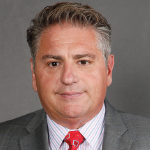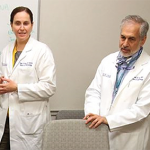
docstockmedia / shutterstock.com
If you had asked Ray Waldrup in 1981 what he would be doing in 2018, serving as the CEO of the largest rheumatology practice in the U.S. would probably not have been his first guess. Back then, as a young college student in Georgia, Mr. Waldrup took a job at a national jewelry retailer and quickly worked his way up to sales, then management. Enjoying his success, he ultimately decided to leave school to pursue a lucrative business career.
“Bill Gates and I dropped out of different schools together,” he jokes. “I started making money, and I never looked back.”
The Business of Medicine
Today, he runs South Carolina-based Articularis Healthcare, which boasts 12 locations in two states. The rheumatology group employs roughly 240 people, including 26 rheumatologists, 12 nurse practitioners and physician assistants, and a pathologist.
“We relieve a lot of the business stress for physicians,” Mr. Waldrup explains. “A lot of them profess to understand it, but if you’re seeing patients all day you don’t have time to keep up with the business side.”
Articularis Healthcare got its start in 2009, when Mr. Waldrup joined a practice with four rheumatologists and 25 employees, Low Country Rheumatology in South Carolina. By then, he had worked with one of the largest anesthesia management companies in the U.S., Medac Inc., and founded Anesthesia Billing Associates Inc. He had developed the expertise, working with multiple specialties, to understand the needs of rheumatologists.
He then sought to expand the practice by merging other providers into it.
“There are 2.4 physicians in the average rheumatology practice,” he says. “I sat down with physicians [in the area] and asked them why they weren’t working with the other group in town.”
He quickly learned that “rheumatologists like to do their own thing,” and growing would take more work, as well as patience. So he let it go for a while, over time continuing to demonstrate what teaming up could help them achieve, like reduced overhead and higher revenues.
“The following year, we had a state rheumatology meeting and asked a couple of attorneys we’d invited to pitch what it would be like to be one group,” Mr. Waldrup says. “We took the three groups that were interested and got started. After a short period of time, we drastically reduced their costs on drugs and their processes in the office.”
‘The whole goal of what we’ve tried to do is keep physicians independent,’ Mr. Waldrup explains.
It’s been nothing but growth since. Low Country Rheumatology, now part of the larger Articularis group, will soon expand beyond South Carolina and Georgia, Mr. Waldrup says.
His business philosophy centers around three core values: people, processes and culture. That means hiring motivated people—no matter where they work in the practice, from the business office to the front desk to the clinic—and taking care of the people he hires.
“The front desk is a landing spot for new graduates, and when I bring someone in with a college degree to the front desk, I let them land for a while as they figure out what they want to do when they grow up,” Mr. Waldrup explains. “I tell them they have to work here for at least a year. After that, if they want to get a job doing something else, great, or I tell them: ‘We can help you grow in healthcare.’”
This aspect is actually one of the most fulfilling of his career. “I can’t tell you how many people have come to me and said, ‘I never would have thought this before working here, but I want to be a nurse,’” he says, recalling several former employees who have gone on to medical or nursing careers, including some who returned to the practice once they earned their degrees.
He also values providing rheumatologists with services that allow them to focus on what matters most: their practice and their patients. Mr. Waldrup shares a text message he has saved on his phone from one of the physicians employed by Articularis:
I truly thank you for all you have done for us. I am happy to see the income go up, and happier to not be stuck in the quagmire of management, keeping up with regulations and compliance and insurance, etc. But most happy and contented to be a part of this group that is filled with great people who mean well for the patients we care for and the staff that we work with. We are fully aware of how integral and vital your role has been through all of this, and it has always been great working with you. Just wanted to let you know how much I appreciate you.
“The whole goal of what we’ve tried to do is keep physicians independent,” he explains.
When he’s not working on behalf of rheumatologists, Mr. Waldrup is tinkering with old cars and enjoying time on his boat with his wife, an infusion nurse at Articularis.
ARHP Membership

Mr. Waldrup
Mr. Waldrup has also been a member of ARHP for five years, serving as a board member before a busy schedule forced him to step down.
“I don’t believe in reinventing the wheel, and the amount of talent you can network with [through ARHP] to learn business policies and different ways to do things from people around the country, that’s a big advantage [to membership],” Mr. Waldrup says. “The other reason is to help other practices and give them advice about things we have learned from.”
Because, he says: “If you’re not learning, you’re done.”
Kelly April Tyrrell writes about health, science and health policy. She lives in Madison, Wis.


